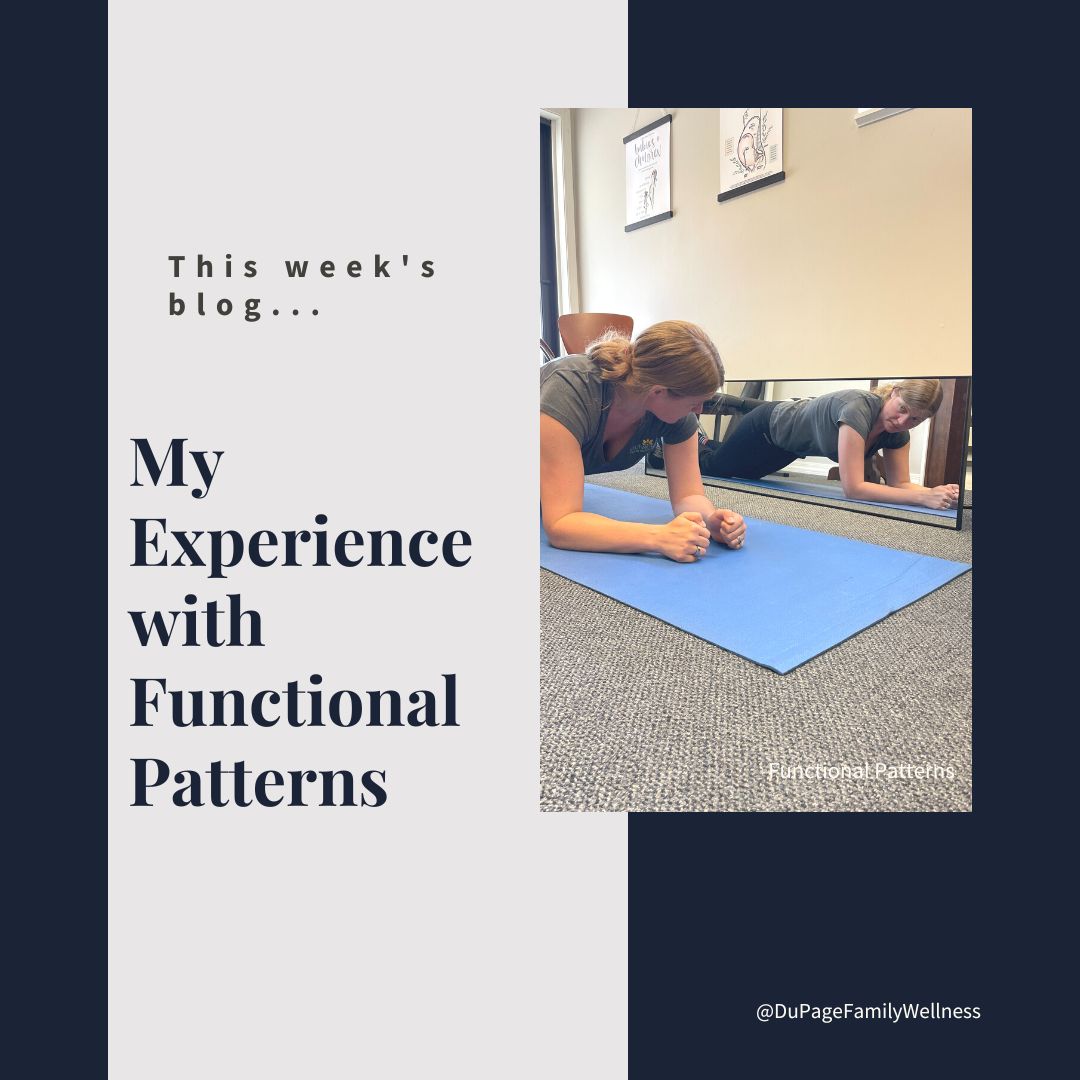 Do you ever find something on social media that you just have to share? It might be a funny meme, sentimental story, or information that reminds you of someone specific.
Do you ever find something on social media that you just have to share? It might be a funny meme, sentimental story, or information that reminds you of someone specific.
Well, a couple of months ago I discovered “Functional Patterns” on Instagram and was immediately intrigued. The leaders of this movement believed many of the same things I do about sleep, nutrition, nature, sun exposure, etc.
As I looked into their perspective on movement, I knew I had to learn more. Everything they said made so much sense. I couldn't stop looking at before and after videos of pictures of different people on their page. I signed up for their 10-week online program and began to work with a trainer. I have already begun to see changes in the way my body feels and moves.
Sharing this program on social media just isn’t enough. I want all of my contacts to hear about it. Let me share a little about it today and encourage you to check it out for yourself.
What is Functional Patterns?
The framework of Functional Patterns was established by Naudi Aguilar in 2009. It is based on the premise that every living animal evolved to have specific patterns of movement.
Fish use their muscles in a side-to-side manner as they glide through the water. A bird's wings move up and down to soar through the air. Each species has very different movement patterns that evolution has given them.
As humans, our main movement patterns are standing, walking, running, and throwing. These motions are at the core of how we move as humans and are crucial for our survival. Through functional pattern exercises our body learns to do these basic movements properly.
How is it Different?
Functional Patterns focuses on the body working as a system. It realizes that strengthening specific muscles outside of full movement exercises can lead to imbalances in the body which can cause harm. It uses human's main movement patterns because if you learn how to execute them it will impact every movement you do.
It begins with myofascial release, causing your body to hydrate the muscles and lose excess tension. Next full-body movements begin to strengthen and stretch muscles in a balanced way. You will quickly begin to notice less pain, more agility, better posture, and a leaner physique.
For me, when I go to a training session with my trainer Tyler, it is not only a physical workout but a mental workout. I am slowly learning to reprogram the way my body moves- my bad movement habits if you will, in order to form better habits that will eventually decompress and balance my spine, rib cage, and frame.
Read more ...
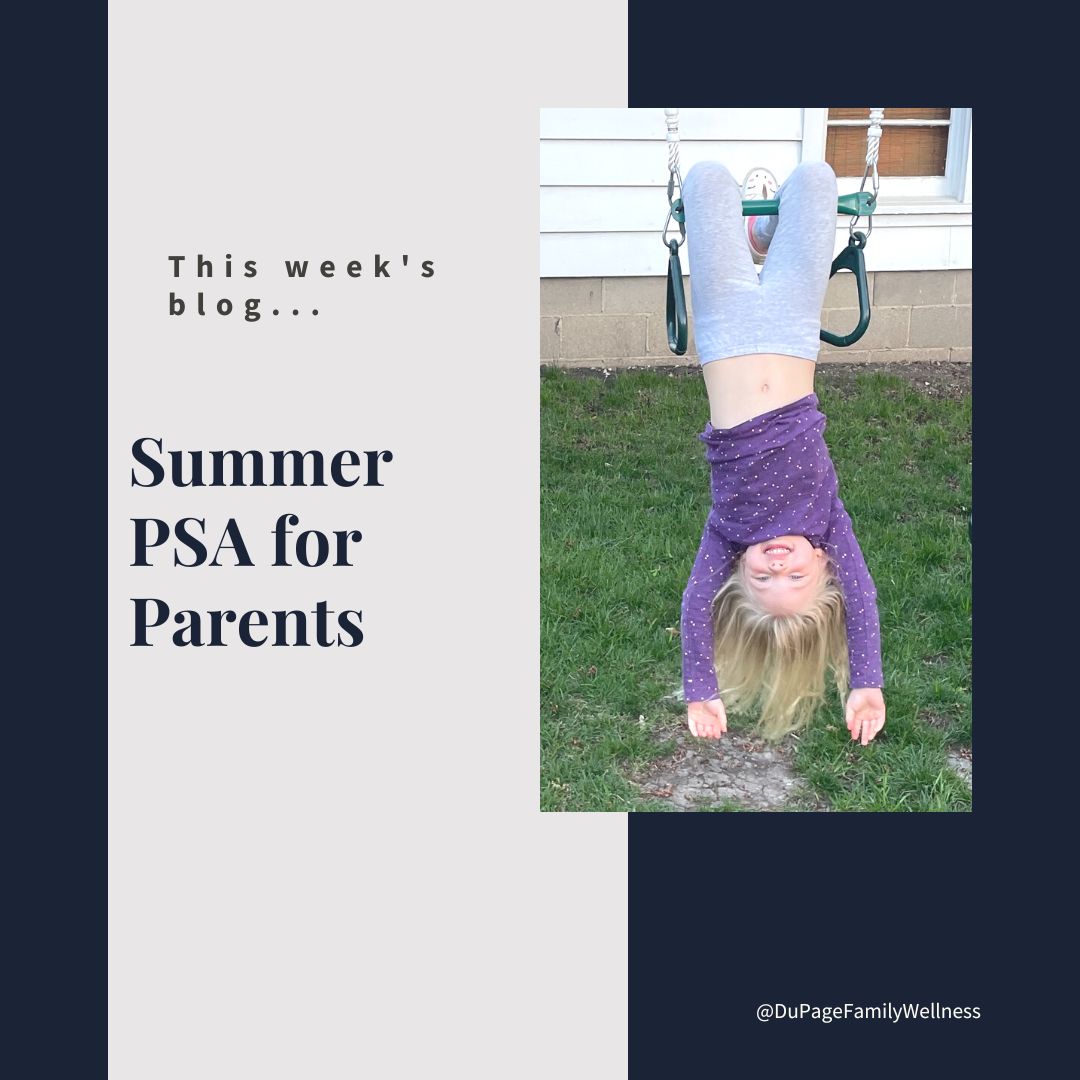 Summer’s here and the kids are (almost) out of school. You may be planning time for outdoor adventures, parks, picnics, and the pool. Many people try to get away over the summer for at least a couple of days and hope to come home feeling refreshed.
Summer’s here and the kids are (almost) out of school. You may be planning time for outdoor adventures, parks, picnics, and the pool. Many people try to get away over the summer for at least a couple of days and hope to come home feeling refreshed.
While summer can be the highlight of a kid's year, it can be challenging for parents. Kids can get restless and begin to whine about being bored. In spite of the sunshine, you may start to count down the days until school begins again.
There are some ways we can let go as parents to set our kids up for a great summer. It may feel counterintuitive, but there’s value in giving our kids more unstructured time where we don’t feel the need to entertain them.
Let’s look at this to see how it might look for your family.
Include Time for Unstructured Play
Many of us spent nearly our entire summer outside playing with friends in the neighborhood. We were responsible for our own fun for hours and hours. But over the course of the last two decades, kids in the US have lost 9-12 hours of free play each week.
Often, parents wanting the very best for their children sign them up for tons of activities. While some structured activities can be great for kids, there are many benefits of independent free play. Through it, kids have the opportunity to…
- negotiate and cooperate with others.
- explore their own interests.
- develop creativity.
- explore personal interests.
- practice independence and decision-making.
- move their body in a more functional way.
Part of the magic of summer happens when we give the kids time to play without direction from adults. There is so much they learn through self-directed play that they would not learn otherwise.
Pursuing Interests and Passions
The summer is a great time for kids to explore their passions through classes, but just giving them time with the proper tools is extremely valuable too.
When children have time to explore their passions on their own they are able to…
- pursue individual interests and passions at a deeper level.
- immerse themselves in the aspects of the hobby that they are most interested in.
- move at their own pace.
- seek to understand the subject on their own, rather than being told what to think.
Try to guide them through any problem or frustration that occurs rather than solving it for them. Show them that you are confident that they can handle most things with a little bit of guidance and encouragement.
Use Screens Wisely
Children often have a way to wear their caregivers down even when limits to screen time are put in place. While there are some benefits to limited screen time, a majority of their time is best used engaging in other activities.
Read more ...
 I am going to start off with a big old controversial statement! From my research, PROPER sun exposure (which means spending time in the sun without burning the skin) does NOT lead to skin cancer. In fact, it actually PROMOTES HEALTH when done right!
I am going to start off with a big old controversial statement! From my research, PROPER sun exposure (which means spending time in the sun without burning the skin) does NOT lead to skin cancer. In fact, it actually PROMOTES HEALTH when done right!
How can this be true and why are so many people misguided? Keep reading to hear more of my thoughts on the matter and look at research that may challenge the common belief.
Learning from our Ancestors
In general, current generations spend less time outside in the sunshine than previous generations. The comfort of an air-conditioned home and other modern technology draws many people inside in warm weather preventing their exposure to the sun.
While there are some precautions that are wise to take, the lack of sunshine is one factor that contributes to the decline of health in modern civilizations. In fact, too little sun exposure may be even worse than too much.
Our ancestors long ago were outside in the sun hunting, gathering, and living in the community. Their survival depended on being out in the elements. They didn’t have temperature-controlled homes, so being outside was common.
Though our ancestors did this out of necessity, modern-day research shows many benefits to this way of living for both our physical and mental health. It is especially important to be intentional about this in northern areas.
Benefits of Sunshine
Sunshine can make you feel lighter, move more, sleep better, and have more energy. It tends to chase away the winter blues, giving us a fresh perspective on life. But did you know there are benefits that can actually affect our longevity?
One study found that sunshine could “reduce blood pressure, cut the risk of heart attack and stroke - and even prolong life.” It states that since heart disease and strokes linked to high blood pressure cause about 80 times more deaths than those from skin cancer, the benefits may outweigh the risks.
But, we may not even have to worry as much about cancer as traditionally thought. According to Dr. Ruscio, sun exposure leads to the formation of the active form of vitamin D (1, 25-OH) which improves DNA repair and may PROTECT the skin from cancer (as opposed to causing skin cancer like most people think).
Other studies suggest that sun exposure demonstrates a significant REDUCTION in all causes of mortality. With this in mind, we must question the belief that sun exposure is dangerous.
Read more ...
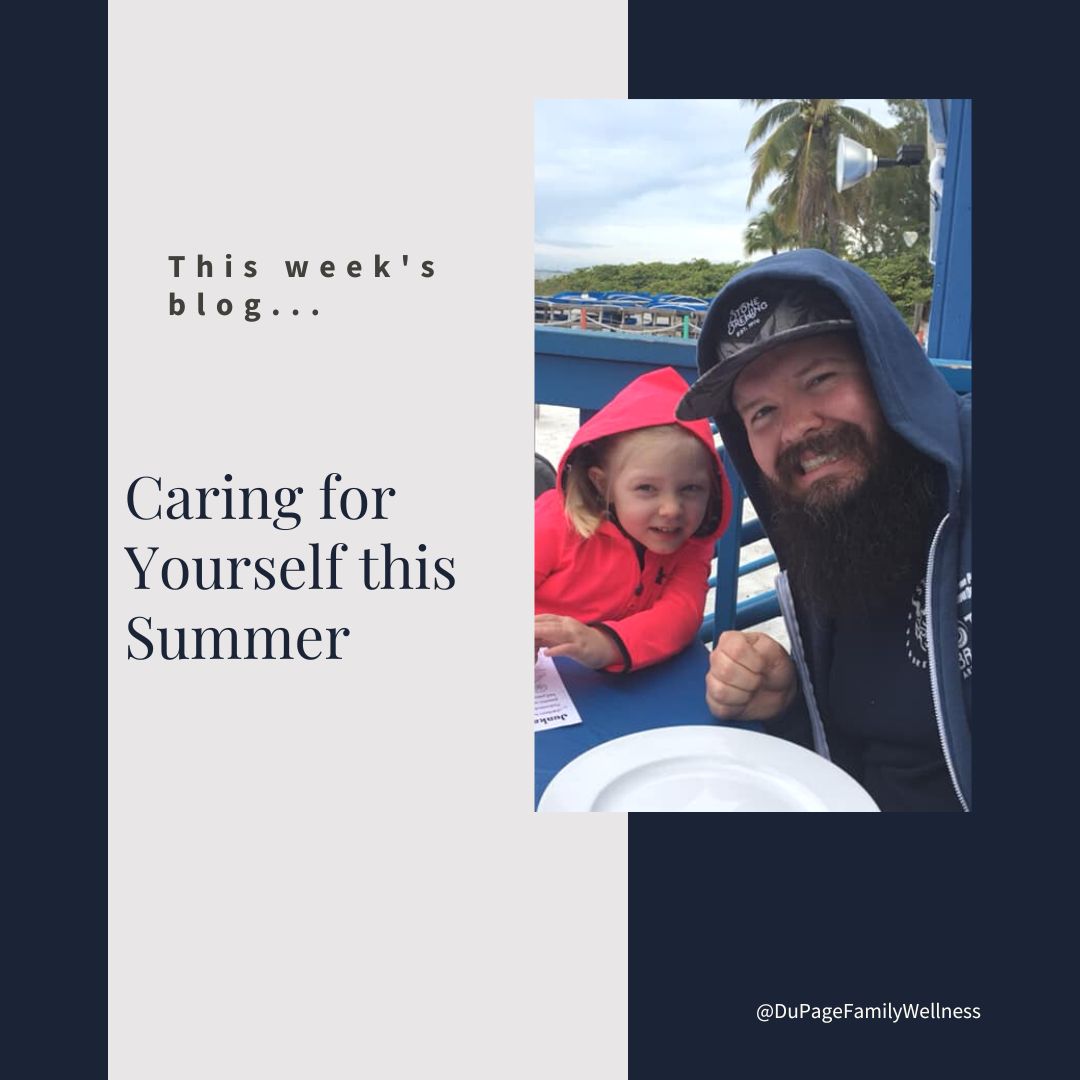 The weather is warming up and it will soon be summer. After a hard Chicago winter, many people are ready to embrace all the summer has to offer. In the process of enjoying the activities that go with summer, we can find ourselves super busy.
The weather is warming up and it will soon be summer. After a hard Chicago winter, many people are ready to embrace all the summer has to offer. In the process of enjoying the activities that go with summer, we can find ourselves super busy.
Whether work is in full swing or the kids are home from school (or both), it’s important to take time for yourself. It doesn’t have to take long or cost a lot of money. Some self-care techniques only take five minutes and are completely free.
While it’s nice to take vacations, the little things may be more practical. They can support you in the day-to-day, allowing you to be present for each special moment of the summer.
Let’s look at some tips for taking care of yourself this summer!
Social Connection
Summer is a great time to connect with those that bring you life. Meaningful social connections impact your mental and physical health in positive ways, leading to parasympathetic nervous system activation. This is often referred to as co-regulation of the nervous system, and it puts you in a rest and digest state of being.
So, connect with friends and family...
- in person if you live close.
- with a video call so you can be face-to-face.
- through a phone call.
- by email or text.
Don’t forget the people in your home. Having a meal together, playing a quick game, reading a chapter of a book together, or going for a walk in the evening can be a great way to connect.
Healthy Boundaries
While you enjoy connections with friends, it is easy to simply go along with what others ask of you. But it is important to consider what is best for you. Accepting every invitation or request can leave you with little margin; overscheduled and overwhelmed. It can also lead to resentment.
It is important to consider what you are willing to give; financially, physically, and even emotionally. After doing so, many of us will find that we need to learn how to say “no” to others without feeling guilty.
Practice Gratitude
Gratitude is good for our brains. It activates the hypothalamus and floods our brains with the feel-good hormone dopamine. It also decreases the prominent stress hormone cortisol, decreases blood pressure, and increases heart rate variability.
By placing our attention on things that bring us pleasure we can cultivate gratitude in an authentic way.
For more ideas on gratitude check out Creating a Gratitude Practice.
Mindful Grounding Techniques
We can tend to live in the past or in the future, but a key to enjoying life is to live in the moment. Grounding is simply bringing your awareness to the present moment. This is done through awareness of your body and surroundings.
Simply closing your eyes and paying attention to your breath brings you back to the present moment. Intentionally looking at things in your surroundings or noticing sensory input can be effective as well. The key is the intention and awareness of the action.
Read more ...
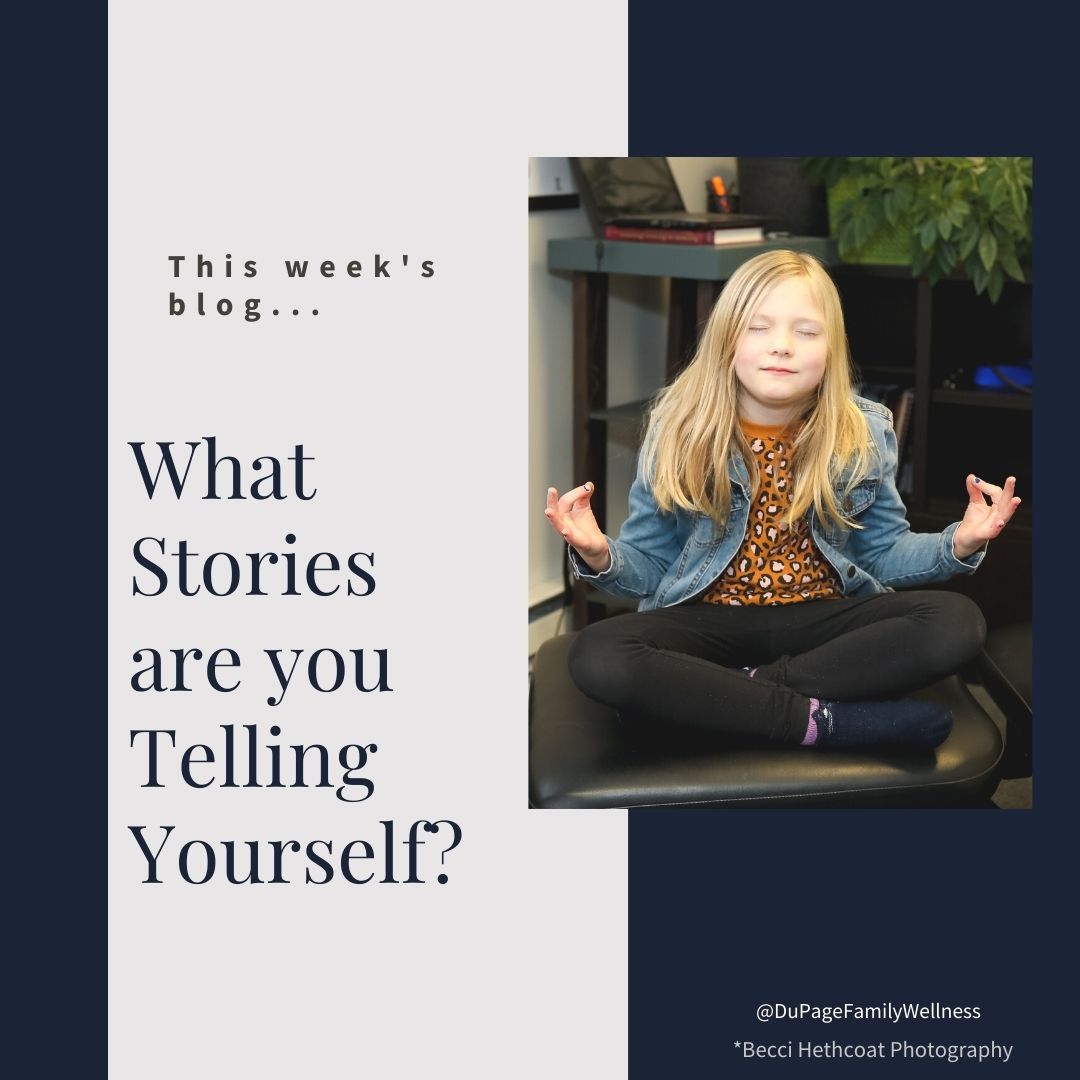 For as long as I can remember, my oldest daughter (7) has been scared to go to bed. She tells me she is scared of the dark or scared to be alone even though she sleeps in the same bed with her 4-year-old sister.
For as long as I can remember, my oldest daughter (7) has been scared to go to bed. She tells me she is scared of the dark or scared to be alone even though she sleeps in the same bed with her 4-year-old sister.
Recently, I challenged my girls to try something new. I explained that if they keep telling themself the same story (I'm scared), of course their brain thinks that it's true.
I continued to share that the secret to feeling something different, is to change what you are telling yourself. Even if you don't believe it yet, when you start telling yourself something enough, your brain will start to believe it and your feelings will begin to change.
What about you? What stories are you telling yourself, and how is that affecting your life? Let’s take a look at it from a child’s point of view and see what we can learn from them.
Changing the Story
I worked with my girls and started practicing positive affirmations. It was a simple concept and very easy to do. I had the girls repeat after me:
- I am safe.
- I am strong.
- I am brave.
Each night when anyone told me they were scared, I reminded them about the affirmations.
Last night, when I gave Harper her good night hug, she whispered in my ear "I am safe, I am okay, I am not scared" and then happily and peacefully went to bed. It was a precious moment that made this mama’s heart glad.
How is this applicable to you?
Let’s take my girl's lead and see if we can change our story. What story do you currently tell yourself over and over again?
- Maybe it's about your looks (I'm fat. I'm ugly.)
- Maybe it's about your finances (I don't have enough money. I’ll always be struggling.)
- Maybe time is more of the issue (I'm so busy. There isn't enough time.)
- Maybe there is something you want to change in your life, but you are afraid of making the change (I hate my job. My relationship isn't working.)
- Maybe your body is hurting or there is a symptom you are struggling with. (I am broken. Things will never change.)
I really encourage you to spend some time thinking about this, and then FLIP YOUR SCRIPT. Maybe it's time to try one (or more) of the following stories.
- I have a pretty face. My body is strong. My smile is beautiful.
- I'm doing what I need to have a better life. There are good things in my future.
- I know how to schedule my day. I have good boundaries.
- I am a valuable employee. Any company would be lucky to have me.
- I am not stuck in this relationship. I have choices.
- My body is strong. I can do the things that will help me heal.
Even if you don't believe the words you are telling yourself when you start, the more you say them, the more your brain will begin to believe them and your reality will start to shift!
Read more ...
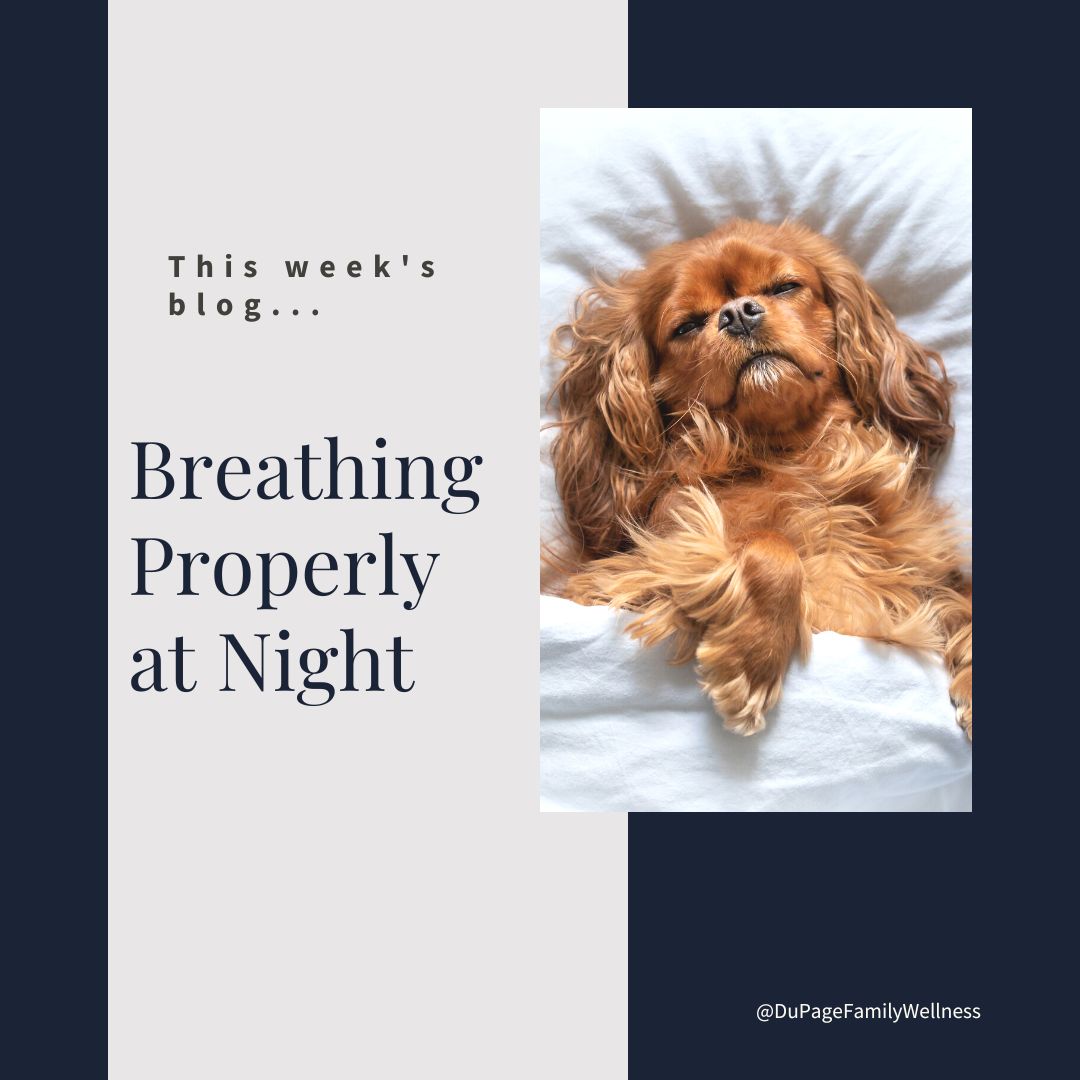 Sleep is one of the most fundamental functions we do each day. Without good sleep, you will not only feel terrible, but you will begin to damage your body. You will likely notice a difference in your energy, mood, and ability to function.
Sleep is one of the most fundamental functions we do each day. Without good sleep, you will not only feel terrible, but you will begin to damage your body. You will likely notice a difference in your energy, mood, and ability to function.
If you consistently wake up from a full night's sleep feeling less than refreshed, you may be dealing with undiagnosed sleep issues. It is always best to be tested by a professional, but in the meantime, there is an easy way to check for a sleep issue in your own home tonight.
This simple test will help you determine if you breathe from your mouth or nose at night. It costs next to nothing and only takes a few extra seconds before bed. Let’s look at what the experts say about this and how to use this information to train your body to sleep well again!
Mild Sleep Apnea
According to Dr. Mark Burhenne of ask the dentist, sleep apnea is the “lack of the ability to breathe properly at night to the point where your sleep is interrupted.” While most people are aware of severe sleep apnea, Burhenne explains that mild forms are often left undiagnosed, especially in otherwise healthy individuals.
Oftentimes a dentist is able to see early warning signs of sleep apnea through features in the mouth. These early signs include gum recession, tooth sensitivity, TMJ, dry mouth, morning headaches, chipped teeth, and nighttime clenching or grinding.
All of these signs can be attributed to the inability to consistently breathe through your nose rather than your mouth. When you breathe through your mouth you do not get the same level of oxygen as you would if you breathe through your nose and it will affect the quality of your sleep.
Why Nose Breathing Is Important
Science has found many benefits of nose breathing over mouth breathing. To begin with, when we breathe through our nose the cilia in our nose act as a filter, purifying the particles of air.
This regulates the humidity and temperature of the air we breathe. As a result, the paranasal sinuses produce nitric oxide which can increase your lung's ability to absorb oxygen by 10-25%. Since nitric oxide has anti-fungal, anti-viral, anti-parasitic, and anti-bacterial properties nose breathing is great for our immune function.
Breathing through the nose also slows and deepens our breath which allows the lungs more time to absorb oxygen and excretes carbon dioxide from the body. Deeper breaths fill the lower lungs which are rich in parasympathetic nerve receptors which help the body to calm and go into the rest, digest, and healing state of being as well.
Dangers of Mouth Breathing
In general, mouth breathing is not ideal, however, in times of danger it can be very helpful. In these situations, we may need to receive oxygen quickly. This is most easily done through mouth breathing. Mouth breathing also fills the upper lungs and triggers your fight or flight state.
While this type of breathing is valuable during intense situations, it causes problems if done habitually. Problems associated with nose breathing include sleep troubles, developmental changes, mouth problems, changes in personality, cognitive issues, and lower immune function. For more information check out this blog post.
Read more ...
 Do you ever find something on social media that you just have to share? It might be a funny meme, sentimental story, or information that reminds you of someone specific.
Do you ever find something on social media that you just have to share? It might be a funny meme, sentimental story, or information that reminds you of someone specific. 

 Summer’s here and the kids are (almost) out of school. You may be planning time for outdoor adventures, parks, picnics, and the pool. Many people try to get away over the summer for at least a couple of days and hope to come home feeling refreshed.
Summer’s here and the kids are (almost) out of school. You may be planning time for outdoor adventures, parks, picnics, and the pool. Many people try to get away over the summer for at least a couple of days and hope to come home feeling refreshed.  I am going to start off with a big old controversial statement! From my research, PROPER sun exposure (which means spending time in the sun without burning the skin) does NOT lead to skin cancer. In fact, it actually PROMOTES HEALTH when done right!
I am going to start off with a big old controversial statement! From my research, PROPER sun exposure (which means spending time in the sun without burning the skin) does NOT lead to skin cancer. In fact, it actually PROMOTES HEALTH when done right!  The weather is warming up and it will soon be summer. After a hard Chicago winter, many people are ready to embrace all the summer has to offer. In the process of enjoying the activities that go with summer, we can find ourselves super busy.
The weather is warming up and it will soon be summer. After a hard Chicago winter, many people are ready to embrace all the summer has to offer. In the process of enjoying the activities that go with summer, we can find ourselves super busy.  For as long as I can remember, my oldest daughter (7) has been scared to go to bed. She tells me she is scared of the dark or scared to be alone even though she sleeps in the same bed with her 4-year-old sister.
For as long as I can remember, my oldest daughter (7) has been scared to go to bed. She tells me she is scared of the dark or scared to be alone even though she sleeps in the same bed with her 4-year-old sister. Sleep is one of the most fundamental functions we do each day. Without good sleep, you will not only feel terrible, but you will begin to damage your body. You will likely notice a difference in your energy, mood, and ability to function.
Sleep is one of the most fundamental functions we do each day. Without good sleep, you will not only feel terrible, but you will begin to damage your body. You will likely notice a difference in your energy, mood, and ability to function.